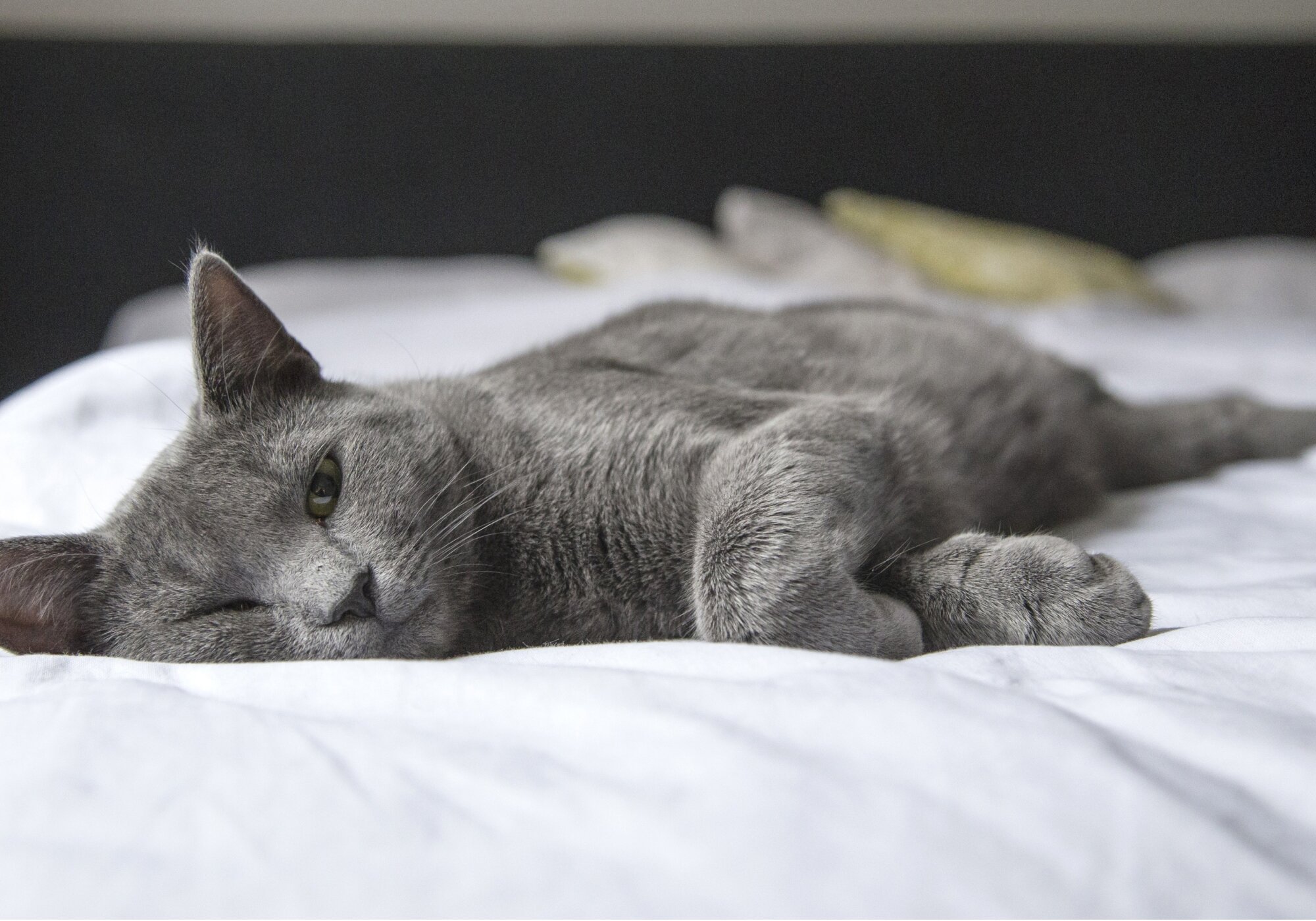Cleaning the litter box is often a cat parent's least favorite chore. But, being familiar with your cat's bathroom habits can help pet parents catch early signs of urinary tract problems.
Urinary tract infections (UTIs) are usually an uncommon condition for cats, but the diseases they cause are. That's why it's important to know the signs of this bacterial infection. Keep reading to learn what UTIs are and how to treat UTIs in cats.

What are UTIs in cats

Urinary tract infections (UTIs) are not common in cats. In general, a UTI occurs in cats when bacteria travels from the cat's urethra to the bladder.
The most common bacterial organism that causes UTIs in cats is Escherichia coli (E. coli). Your vet can determine if E. coli is the cause of your cat's condition through a urine sample.
Some cats can develop other urinary tract issues as a result of an untreated UTI. So, it's important to start treatment as soon as you suspect your cat is suffering from a urinary tract infection.
What causes urinary tract infections in cats
UTIs start for a variety of reasons and some cats are more susceptible to UTIs than others. Bacterial infections are most common in female and male cats who are:
- Older (middle-aged)
- Overweight
- Use an indoor litter box
- Have little outdoor access
- Eat a dry food diet
Older female cats with diabetes mellitus (sugar diabetes) develop UTIs more often than the average population. Some other common causes of urinary tract infections in cats include:
- Loss of bladder control
- Spinal cord issues
- Bladder infection or inflammation
- Injury or tumor in the urinary tract
- Congenital disorders
- Emotional or environmental stressors

How to tell if your cat has a urinary tract infection

If your cat has a urinary tract infection, they might suffer from clinical signs. Be mindful of your cat's symptoms to understand if they could be from a UTI.
Symptoms of urinary tract infections in cats
- Excessive licking
- Urinating outside of their litter box
- Bleeding while urinating
- Straining to urinate
- Crying out or whining while urinating
Urinary tract diseases
While UTIs are relatively uncommon, urinary tract disorders and diseases are fairly common in cats. Here are a few common urinary tract disorders in cats.
Feline Lower Urinary Tract Disease (FLUTD)
FLUTD symptoms can vary from mild to serious. FLUTD occurs when there is a defect in the structure or function of your cat's bladder.
The most common signs of FLUTD in cats include:
- Painful urination
- Frequent urination
- Inappropriate urination
- Bloody urine (litter box blood)
- Frequent licking of the genital area
The most common causes of lower urinary tract disease are infections, inflammation, diet, and behavioral issues. This condition is also common in male cats.
Feline Idiopathic Cystitis (FIC)
Feline Idiopathic Cystitis is the term for cats who are diagnosed with FLUTD, but don’t have an identifiable underlying cause. This means that it’s not clear how your feline friend contracted the disease.
The symptoms of FIC are the same as FLUTD. When a feline suffers from FIC, their bladder becomes inflamed. If left untreated, your cat could develop a urethral obstruction, which can cause problems for your cat when urinating.
Bladder (urinary) stones
Bladder stones are rock-like formations of minerals that develop in your cat's bladder. The three most common clinical signs of bladder stones in cats are:
- Straining to urinate
- Blood in the urine
- Abdominal pain
Small stones form and pass through the urethra. The presence of stones in your cat's urinary tract can cause irritation and inflammation. All of which can be extremely painful for your kitty.
Large stones can cause blockages at the neck of the bladder. When an obstruction occurs, your cat is unable to empty their bladder fully. If an obstruction is not removed through a surgical procedure called a cystotomy, your cat's bladder can rupture.
VET TIP
If your cat is unable to urinate, seek immediate veterinary care. If left untreated, your cat can experience life-threatening symptoms.

How to diagnose urinary tract infections

The best way to diagnose a UTI is to visit your vet for a cat check-up. Your vet might choose to take a urine sample or other types of urine tests.
Urinalysis
A urine sample can show important information about your cat's urinary health. This test determines the levels of pH, glucose, blood, and other minerals in your cat's urine. The results help your vet determine if your cat is suffering from a UTI.
Culture and sensitivity test
A culture and sensitivity test is necessary to identify bacteria that may be causing lower urinary tract issues. In this test, small amounts of urine get sent to a laboratory. There, a urine culture will be set up to grow the bacteria and determine an infection.
Diagnosing a urinary tract infection is important for pet parents to determine the severity of their cat's case. This can help inform your vet who can help guide you on the best method of treatment for your cat.
Veterinary treatment for urinary tract infections in cats
Urinary tract infections can range from mild to serious. Cats with more serious issues should receive medical attention and care immediately.
If your cat suffers from serious urinary tract problems, your vet might suggest certain treatments to relieve their symptoms, like:
- Antibiotics
- Pain medications
- Urinary acidifiers
- Fluid therapy
- Urinary system catheter
- Surgical removal of bladder stones
If your cat gets bladder stones, the likelihood of having another urinary tract infection (UTI) increases. So, be sure to have your vet diagnose urinary stones early if you detect other clinical signs of a UTI.
How to treat UTI in cats at home

Not all cases of cat UTIs need medical treatment. If your cat's UTI is mild, there are a couple of remedies pet parents can try at home.
1. Change your cat's diet.
To restore bladder health, diet changes may be necessary. The kidneys are responsible for filtering phosphorus in your cat's body. Try switching to a canned food diet that is high in protein and low in carbohydrates. Look for a food option that is low in phosphorus to reduce stress on their kidneys.
2. Boost your cat's hydration.
Overweight, dehydrated female cats are more susceptible to UTIs. So, besides diet changes, pet parents should also increase their cat's water consumption. Adding extra moisture to your cat's food is an easy way to help them stay hydrated.
Bone broth
Consider adding bone broth with no added salt to your cat's food. You can also provide it as an alternative to water to promote hydration. Plus, bone broth has other vitamins and nutrients that can help fight infections.
3. Balance their pH.
The presence of apple cider vinegar in your cat's meals can lower their pH to help eliminate harmful bacteria. If your cat currently has a UTI, apple cider vinegar can relieve their symptoms fairly quickly. To treat a UTI, mix 1/2 teaspoon of vinegar with 1 teaspoon of chicken broth into your cat's food every day.
Frequently asked questions about UTIs in cats
Urinary tract infections can be a worrisome topic for pet parents. Be confident you have the knowledge to help treat urinary tract disease in cats with these frequently asked questions.
How do indoor cats get bacterial urinary tract infections?
If your cat does not have adequate access to the outdoors they may develop urinary tract health issues. This is why indoor cats are more prone to urinary tract infections.
Can cats get UTIs from dirty litter boxes?
Yes, dirty litter boxes can make cats more prone to developing urinary tract disease. If your cat's litter box is full of waste, bacteria may travel up your cat's urethra and lead to infection.
What causes bladder problems in cat food?
Cat food that has too many minerals can cause the formation of crystals in your cat's urine. This includes calcium, phosphorus, and magnesium. These crystals can develop into bladder stones over time.
Does a cat UTI go away on its own?
If your cat has a strong immune system they might be able to battle a mild UTI on their own. But, cases of feline lower urinary tract disease and UTIs need treatment from a vet.


